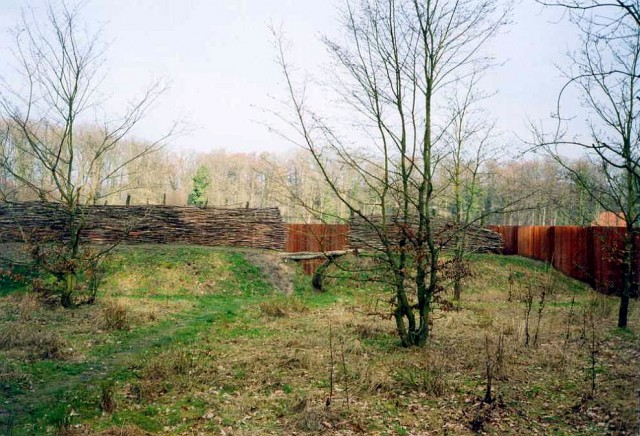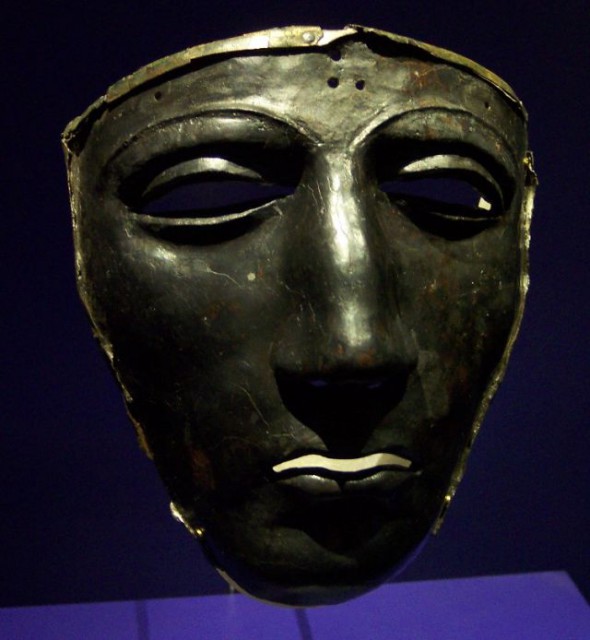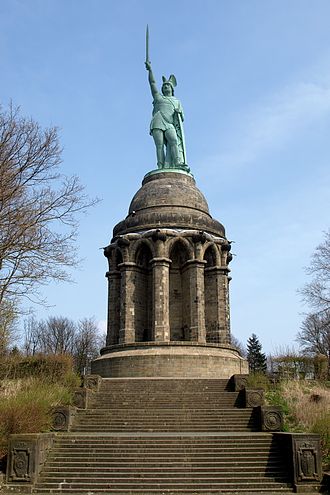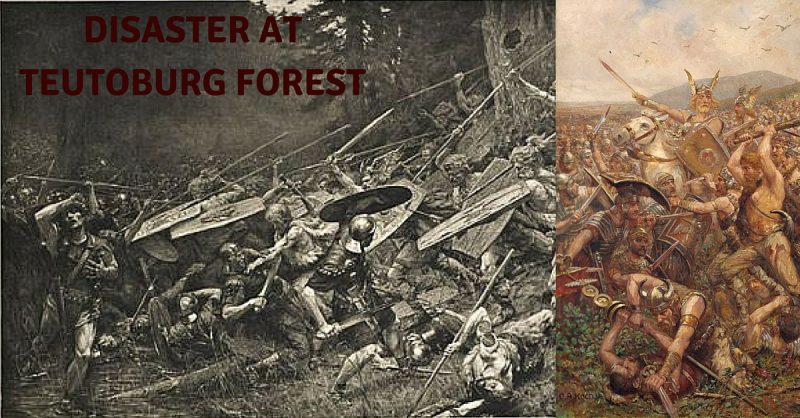The Battle of Teutoburg Forest was one of the worst defeats suffered by the Roman army in its entire existence not in terms of men lost, though many were, but in terms of setting limits to Roman expansion and dispelling the reputation of the power of the Roman army. The Romans were at the height of imperialism and had gained a large amount of territory under Emperor Augustus. Some of these territories were hard won but the Romans usually persevered in a territory until it was conquered until they met disaster in the Teutoburg Forest.

The Teutoburg forest in Germany is a mountainous region covered by a dense forest located just southwest of modern Hanover. The German tribes who lived in the area were quite mobile and often times did not stay long enough in any one place to cultivate crops and were able to load their possessions on wagons and go very quickly. Despite the nomadic lifestyle the area around Teutoburg held a large population of many different tribes most of whom were hostile to Rome.
Much of the area of Germany had been pacified a few years before by Tiberius who would later be the successor to Augustus. Tiberius had made a lot of progress in the area essentially conquering tribes and reconquering them if they revolted. Tiberius fought it Germany until 6 CE when he was called to end a revolt in Illyria and Quintilius Varus took his place in Germany and was known for a degree of cruelty and treating subjected nations as slaves of the empire. Varus was a confident man and would prove to be a very trusting man as well.
Varus initially had a great sense of security as he immediately went into German territory and spread out his legions in order to bring Roman law to where it was needed. The sense of security was likely because the tribes in the area had suffered many defeats in living memory and knew that they likely could not successfully revolt, though the hatred was still there. The other factor giving Varus a sense of power and security was his close advisor Arminius who was from this area but had been raised in Rome as a hostage. Once Arminius was in Germany with Varus he began to contact German tribes to set up an attack.
While heading back to the winter fort near the safer Rhine River, Varus was told of rebellion to the East, deeper in German territory. Arminius had advised Varus of this uprising which was likely fabricated and Arminius also proposed a quick route to get to the rebelling area which conveniently led through areas of dense forests and multiple valleys. Varus took three legions along with an equal amount of auxiliaries with an estimated total around 30-35,000 soldiers with a significant number of camp followers.

Varus marched eastward with his forces however the terrain forced the column to stretch for miles and become disjointed. Varus also neglected to stop to reform the column of march and with the dense forest, rolling hills and increasing fog and rain, the soldiers could hardly see what was going on with any part of the army other than their immediate surroundings. Arminius slipped away into the woods with all the allies who were loyal to him. While Varus and the rest of the legion were realizing that he was gone, Arminius was busy sending multiple contingents of Germans into position along the Roman line of march and sending word to all tribes that a Roman army was primed for destruction.
The Romans were in a very poor position and at their weakest. They have been marching for days in a long, disjointed column. They were likely tired and not in full battle dress. They had been fighting through the thick forest for most of the journey. With the heavy fog and rain turning into a downpour, Arminius attacked.

The attacking Germans were quite timid at first, after all they were attacking a Roman army and many men had seen defeat at the hands of Romans before. As the Germans continued attacking they realized how weak the Romans were and went in with full force. The Romans suffered greatly but in credit to Roman training, they were able to form a central position and construct a fortified camp as best as they could and wait out the night. Arminius likely had a rotation of skirmishers harassing the camp through the night although the continuing rainstorms likely reduced the effectiveness.
The next day Varus exited the camp and sought to escape to more favorable terrain. Punching through to another forested area the Romans suffered and likely many of the non-combatants perished while being unable to keep pace. Over the course of the day the Roman’s began to lose their most vital equipment, their shields. The constant downpour soaked the already heavy wooden shields and those armed with bows found them to be slackened by the rain. The Germans did not suffer much from this as they had much smaller shields as well as being in home territory with plenty of access to fresh equipment. The attacks continued throughout the day and during the night the Romans constructed a camp and attempted to escape in the early hours of the morning.

Unfortunately for the Romans, Arminius had his men spending the night cutting ditches through roads and felling trees to create only one distinct route the Romans could take. Arminius lined this narrow route with soldiers and had them create an earth wall to allow them both cover and a slight height advantage on the Romans. When Varus marched out of camp he led his forces through the path Arminius set for him and met a dead end at the base of a hill. The Romans were exhausted after several days of marching and fighting all through a continuous storm and were spread between their camp and a dead end of Germans. At this point the Germans rushed towards the Romans with full strength. The German army had grown considerably larger as word had spread of the previous day’s successes and men from miles around came for a chance to plunder.
What happened next was an almost complete breakdown of the Roman army. The second in command, cavalry commander Vala Numonius fled with much of the cavalry but was killed soon after. The Romans made many attempts to scale the earthen wall but either failed or were quickly overcome upon reaching the other side. The Roman command collapsed when Varus and many other officers decided to take their own lives. Many of the men lost complete control and cast away their weapons to be killed by whoever arrived first. Small groups tried to flee in every direction but most were killed or captured quickly. Losses for the Germans are hard to pinpoint but estimates are around 1,000. The Romans lost around 20,000 men with many being enslaved. A little over 1,000 Romans, led by camp prefect Caedicius, were able to escape.

When news reached Rome Augustus took it badly. Though it may well be an exaggeration, Suetonius says Augustus let his hair grow out and went unshaven and periodically shouted “Varus, give me back my legions” while beating his head on a door. While this certainly seems like an exaggeration Augustus still took the news hard and had the anniversary become a day of mourning.
After the initial shock of the defeat wore off, Augustus’ successor Tiberius had one of his best generals, Claudius Germanicus, invade Germany in 14 CE Germanicus had great success in Germany and even sprung an ambush with heavy losses incurred by the Germans. From 14-16 CE Germanicus fought many successful battles against the Germans. Germanicus would later find

the site of the Varian disaster and discover skulls pinned to trees and heaps of bones. He was able to recover two of the lost legion eagles with the third being recovered some time after. Arminius was a hero after the battle and today remains a proud symbol of Germany but he had a hard fall from grace as he suffered several defeats as the Romans sought retribution. he faced anger from multiple tribes but was ultimately murdered by members of his own tribe who felt he had too much power.
It is easy to see how powerful this battle was beyond just the amount of men lost. Losing a legionary eagle was an utter disgrace; even in terrible defeats every effort was made to save the eagle but in this case three eagles were captured. It is a testament to the staying power of the Germans that they were able to fend off the Romans when they were arguably at their most powerful. Great military leaders such as Augustus, Tiberius and Germanicus were all accomplished conquerors but despite winning multiple battles against the Germans they still were not able to effectively subdue them.
